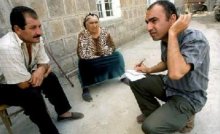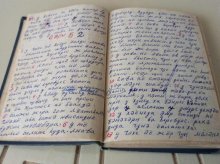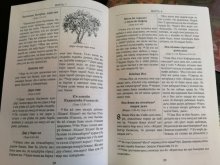 Very soon another complete Bible will be published by IBT. This time it will be in the Kurdish (Kurmanji) language. We expect the first print-run in Cyrillic script in 2024 or early 2025, followed by a Roman-script edition, since the Kurdish community is scattered in different countries that use different scripts. On the eve of such a big event, we managed to interview IBT’s head Kurdish translator, taking advantage of a meeting of the Kurdish team in Moscow. I asked him if there is much interest among the Kurds in having the full Bible. In response, he told us a very personal story, and when telling it, he could not hold back his tears:
Very soon another complete Bible will be published by IBT. This time it will be in the Kurdish (Kurmanji) language. We expect the first print-run in Cyrillic script in 2024 or early 2025, followed by a Roman-script edition, since the Kurdish community is scattered in different countries that use different scripts. On the eve of such a big event, we managed to interview IBT’s head Kurdish translator, taking advantage of a meeting of the Kurdish team in Moscow. I asked him if there is much interest among the Kurds in having the full Bible. In response, he told us a very personal story, and when telling it, he could not hold back his tears:
The following story took place in 2002, when the Kurmanji New Testament was being distributed. I was in Novosibirsk at the time and there I met a man whom I had last seen in 1978. At that time he had insulted me, calling me a swindler and traitor to our people. But, perhaps, to make it clearer, let me start from the very beginning.
For the first 22 years of my life, I was a pagan (in the literal sense of the word). But I was looking for God. I was looking for the God who could raise people from the dead to new life. My parents could not answer my questions. All my relatives died one by one. And then, one day I met a man, an Armenian (I was still living in Armenia at the time) who asked me, “Why are you so dissatisfied with your life?” I replied, “We are all going to die. Why is the world created in such a way that man is born only to eventually die? They say there’s a God. But who is this God? I want so much to meet Him, to ask Him questions. It’s normal for sinners to die for their disobedience. But for me, personally, what should I do to not have to die?” And this Armenian told me about Christ for the first time. This was in 1973. I asked: “Who is this Christ? Is he a man, or an angel, or who is he?” The man began to explain it to me from his Bible. I saw that everything was written in Armenian, so I asked him: “Is Christ the God of the Armenians?” He said, “No, He is not the God of Armenians; this book is translated from Hebrew.”
 I thought, “If God is Almighty, He must know my thoughts. And if this Bible is from God, He must answer me through the Bible.” So I asked the man to give me his Bible for a month to read. He told me, “Start right here” – and opened it to a page somewhere in the middle. I didn’t understand why. Usually when a person starts reading a book, he reads from the beginning. I asked: “Why is that?” He answered, “You won’t understand now, but first comes the Old Testament, while it’s better for you to start from the New Testament.” And it proved to be true: when I started reading from the first book of the Old Testament, it wasn’t quite clear to me. But when I turned to the New Testament, the Gospel of Matthew, I liked everything so much that I began to translate it from Armenian into Kurdish. I still have this manuscript with my 1973 translation. Within a month I had translated the whole Gospel of Matthew. Then he took the book back and I started reading my manuscript to other Kurds, relatives and acquaintances. They listened and at first they said, “This all sounds like our very own!” But when they saw that I was reading from a manuscript, they began to blaspheme and yell at me, “You're a swindler, you’ve rewritten this from some foreign religions!”
I thought, “If God is Almighty, He must know my thoughts. And if this Bible is from God, He must answer me through the Bible.” So I asked the man to give me his Bible for a month to read. He told me, “Start right here” – and opened it to a page somewhere in the middle. I didn’t understand why. Usually when a person starts reading a book, he reads from the beginning. I asked: “Why is that?” He answered, “You won’t understand now, but first comes the Old Testament, while it’s better for you to start from the New Testament.” And it proved to be true: when I started reading from the first book of the Old Testament, it wasn’t quite clear to me. But when I turned to the New Testament, the Gospel of Matthew, I liked everything so much that I began to translate it from Armenian into Kurdish. I still have this manuscript with my 1973 translation. Within a month I had translated the whole Gospel of Matthew. Then he took the book back and I started reading my manuscript to other Kurds, relatives and acquaintances. They listened and at first they said, “This all sounds like our very own!” But when they saw that I was reading from a manuscript, they began to blaspheme and yell at me, “You're a swindler, you’ve rewritten this from some foreign religions!”
Then I began to pray, “Lord! You see how people misunderstand. They think I wrote this manuscript myself. Give me Your book in my own language!” Time passed, and we met with a representative of IBT. I let him see my translation of Matthew ch. 7 and asked him if he could find a Bible in Kurdish for me. He read my translation, came back to me and said: “No, there is no such book in Kurdish, but if you like – the founder of IBT, Borislav Arapovich, would be glad to meet with you.” That’s how my work on the translation began. The Kurmanji New Testament was first published in 2000, and there are no more copies of those New Testaments left. They were all sold out.
 And now back to Novosibirsk in 2002. A woman from the church had invited me to her home, and when I paid her a visit, I noticed that one of the men there was looking at me very intently. Suddenly, he turned to me and asked, “Is that you?” – and called me by name. I recognized him as the relative who had insulted and berated me in 1978, calling me a swindler and a traitor when I tried to introduce him to my translation of the Gospel. And now, in 2002, he asked me to come over, took me by the hands and led me to his room. “See this?” he pointed to an open New Testament in Kurmanji. “If I didn't have this book, I wouldn't be here today.” He related the following: “My niece started going to church. She brought me this New Testament in our language and said, ‘This book will help you come out of the depression you’re in.’ And now I’m reading it.”
And now back to Novosibirsk in 2002. A woman from the church had invited me to her home, and when I paid her a visit, I noticed that one of the men there was looking at me very intently. Suddenly, he turned to me and asked, “Is that you?” – and called me by name. I recognized him as the relative who had insulted and berated me in 1978, calling me a swindler and a traitor when I tried to introduce him to my translation of the Gospel. And now, in 2002, he asked me to come over, took me by the hands and led me to his room. “See this?” he pointed to an open New Testament in Kurmanji. “If I didn't have this book, I wouldn't be here today.” He related the following: “My niece started going to church. She brought me this New Testament in our language and said, ‘This book will help you come out of the depression you’re in.’ And now I’m reading it.”
He talked, and I was about to leave, with my train tickets in hand, but he stopped me: “Wait, wait. Do you remember how I insulted you, your wife and all your relatives? Now pray for me that my sins may be forgiven.” He knelt down, we prayed, and he tearfully exclaimed: “Lord Jesus Christ, forgive me!” He had once told me that Jesus was not one of us, that He was an enemy of the Kurds, but now it was revealed to him who Christ was, and he turned to Him in prayer. I left, and shortly after my return home his niece called me to announce that three days after our meeting her uncle had passed into eternity.
Kurdish believers, who are still reading the New Testament in Kurmanji and the Old Testament in Armenian, are waiting for a complete Bible in our own language because there are words in Armenian that they do not understand. The Armenians did not at first believe that the Kurdish translation was of high quality. They thought I had made a quick translation from Armenian, not from the languages of the Bible, Greek and Hebrew. Once, an Armenian pastor from an Evangelical church invited three other pastors and they tested my translation. They chose passages from Scripture and asked me to translate them word for word from Kurdish into Armenian. I translated everything, they looked at each other and summarized: ‘Your Kurdish translation is correct, while our Armenian translation has mistakes in these places.’ Bible study in church groups has shown that many passages in the Armenian Bible are incomprehensible because the Armenian translation was produced in an ancient form of the language and is quite outdated. In the Kurmanji translation, on the other hand, we aimed at contemporary language from the very beginning, so that it would be accessible, as long as the meaning was conveyed correctly. When the phrases are in one’s native language, it opens people up. So now that we’ve completed the Bible, people are very eager to see it published. They really like to read the translation in clear Kurmanji. And every day the number of Kurdish believers in Christ is increasing.”
We would greatly appreciate your financial assistance towards IBT projects. You can find IBT's bank info in Russia below. If you prefer to send your donation through a forwarding agent in the U.S. or Europe, please write to us and we'll provide the details of how this can be done.

Share: